- Home
- Joseph Bruchac
Two Roads Page 3
Two Roads Read online
Page 3
Pop does not mention our hobo signs. No need for anyone outside of our society of knights of the road to know.
“Well,” he says, “getting welcomed by the barrel of a rifle was a bit of a giveaway. Steal from you?”
Miz Euler nods, pressing out her lower lip as she does so.
“Three chickens thus far, my best butcher knife that I had left on the back porch, and an iron kettle I could ill afford to lose.”
“How long ago?” The tone of Pop’s voice has changed now from idle questioning to focused intent.
“Two weeks ago was the first chicken. I would have thought it a fox or a weasel if I had not seen the footprints around the coop. The knife was next to vanish a day or so later. That was when I started keeping watch, and keeping Sam’s gun at the ready. I used to not mind someone coming through offering to work for a meal. But after that knife vanished I started doing what I did with you—warning anyone away before they got close to the house. They might have been honest hoboes, but I felt I could not take the chance.”
“Shame you had to do that,” Pop says. I can hear anger below the calm surface of his voice. “And when did that kettle turn up missing?”
“Two days ago.”
“Ah,” Pop says.
I know what that means. We are, for certain, going to do something.
CHAPTER
THREE
TRACKING
“We’ll be back in a bit,” Pop says, pushing away from the table. “Just going to take a little walk.”
Out back a few small maples have grown up along a rail fence. Pop uses his jackknife—just like the one I own—to cut a thin six-foot-long stick from one of those trees. Then he peels the bark off that stick, which he will use for measuring. It’s shiny yellow, and its scent, which I love, is bitter and sweet at the same time.
We start off at Miz Euler’s chicken coop, a well-built little house with a screen door at the front and two dozen nest boxes across the back wall. It is spotlessly clean, probably swept out twice daily. Painted white, with little flowers drawn on the outside walls, it’s bigger than most shelters Pop and I have rigged up whenever we’re stayed a day or two in a jungle. Truth be told, it is better made than any of the shanties in the Hoovervilles, growing up like weeds all over the land these days.
Pop sees me studying the henhouse. He pats the side of it with his hand.
“Sam made this,” he says. “A man who always took pride in his work.”
I peer inside. All the nests but two are filled with hens that lift their head to look up at us. Seeing no threat, they settle back, making the chuckling little clucks you hear from contented chickens. Another dozen hens, none of them layers, and a strutting rooster occupy the fenced-in yard behind the coop.
Pop walks around behind the house, slow and careful, his eyes on the ground. I stay two paces behind.
“Here,” he says.
I look down at what he is pointing at with the tip of his measuring stick
There, in the soft earth, is the print of a man’s right boot.
Pop puts his own right foot next to it, presses down to make an impression of his own, then steps back.
“What do you see, Cal?” he asks me.
I kneel down by the two prints. I notice right off that the unknown man’s boot is two sizes larger than Pop’s. From the depth of the impression, he’s considerably heavier than Pop’s hundred and fifty pounds. I don’t mention either of those deductions, though. Pop takes it for granted—with all he’s taught me about tracking—that I’ll see such.
Picking up a twig, I point to a line at the back of the heel print.
“Yup,” Pop says. “Good eyes, son. Something made a cut across his boot heel. That makes his print like no other. Now there’s the left print and another right one.”
He takes his stripped stick and measures the distance between strides as well as the direction that trail leads toward the woods.
Then we commence to follow.
Where the ground is hard, Pop uses his measuring stick, laying it end over end until he locates another track. He also takes notes of such thing as broken-off dead branches where the chicken thief forced his way through some small pines. Pop is an ace tracker. Learned from his own father, a grandpop I never met—him having passed on before I drew a breath.
Beyond my parents, I have never met any other of my kin.
There are good reasons for that. After going off to school, Pop explained, he lost touch with his own relations, most of whom passed on while he was away—as did his mother and father.
“There’s no other Blacks to be found,” he sometimes says.
As far as my late mother’s side goes, there’s no way I can ever make any connection there. That was so even before her sickness took her two years ago. Mom had come West as one of the children on an orphan train.
“Look here,” Pop says, bringing me back out of my cogitating.
We have gone about a mile and found ourselves on the other side of the woods with an open field before us. There are no tracks, cut heel or otherwise, to be seen ahead of us.
“Thinks he’s clever, don’t he?” Pop says.
I nod.
“So what did he do?”
I point with my chin toward the pine tree behind us where a low branch has been broken off so recently that the sap is still oozing. A branch meant to serve as a sort of broom by a man walking backward and sweeping away his tracks behind him.
“So what do we follow?”
I look ahead of us. A six-foot-wide swath of smoothed earth stretches across the red soil of the field.
“The trail of no trail,” I say.
Pop smiles and slaps me on the back.
“Lead on,” he says.
The footprints begin again a few feet past the edge of the field where that pine-branch broom, its needles just beginning to turn brown, has been cast aside.
I keep following the trail, Pop a few feet behind me, till the land drops off into a small valley. I reckon it is not far from the train tracks, which I remember being on the other side of the next hill. Sure enough, as we stand there we hear the distant whistle of a locomotive still miles away.
Pop pulls out that pocket watch, which he regards as his one and only useful valuable—aside from his service certificate. That paper, to be honest, he describes as “almost valuable” seeing as how he still has to wait thirteen years before he can cash it in.
“That’ll be the three-o-five,” he says. “If we were planning to ride it, we’d have plenty of time to reach the uphill grade where it slows on the back side of that ridge.”
Pop snaps his watch shut and slips it back into his vest pocket.
“Now, though,” he says, “duty calls.”
We go quiet down the slope, using the toe-to-heel walk Pop started teaching me as soon as I reared up on two legs. Neither of us makes more noise than wind through tall grass.
On the level ground at the base of the hill I note a single deep footprint, a cut across the heel. Not that I need to see it. The chicken thief’s camp is in plain sight.
It’s a ramshackle affair. A tent constructed of a piece of canvas stretched over the low limb of an oak tree. It’s tacked to the branch on top with bent nails and held in place at the bottom by rocks at the base. Five feet in front of the shelter, a black pot is balanced on the stones of a cold fire pit. The mess of feathers, hacked-off chicken legs, wings, and heads off to the left of the pit leaves no doubt that this is our man.
Two boots are sticking out from under the lean-to. As we get closer, still quiet walking, I see the right shoe has that telltale cut across the heel. Though the rest of him is concealed by the low-hanging canvas, his feet are in those clodhoppers. The sound of snoring leaves little doubt we’ve come up unnoticed, helped, no doubt, by the drained whiskey bottle next to the fire pit.
<
br /> I shake my head. Not only is this man making it bad for other ’boes by being a thief, he is ignoring the sixth rule of our ethical code:
Do not allow yourself to become a stupid drunk and set a bad example.
There’s a stack of newspapers on a stump. One thing in the fellow’s favor, I suppose. That he can read, I mean. On the other hand, there’s little chance he spent a penny to buy a paper. Likely stole that pile from people’s porches. Maybe he is just using those papers to start his fires.
Pop picks up the topmost paper, which seems to have caught his eye. He reads a bit of it, folds it, sticks it in his back pocket.
Then Pop looks at me and nods. He walks over and kicks the sole of the man’s left boot.
“Rise up,” Pop commands, in a voice like that of Jesus lifting Lazarus from the dead.
The result is more dramatic than I expected.
Rise up is indeed what our cut-boot chicken thief does— propelling himself from horizontal to vertical so that he brings that makeshift tent right up with him, making him look like some sort of a ghost in a canvas shroud. It’s a funny sight to see.
Or it would be funny were it not for the fact that the man is clutching a butcher knife—no doubt the one he purloined from Miz Euler—in his right hand.
He’s big—both in height and girth. As he swings that blade wildly every which way he is growling like a gorilla and bellowing out a series of homicidal remarks.
“I’LL CUT OUR YER LIVER! DANG YEH! I’LL KILL EVER ONE OF YEH! YER DEAD MEN EVER ONE OF YEH!”
His blind soliloquy is cut short by Pop stepping to the side and taking the man’s legs out from under him with a quick kick to the big tramp’s ankles. As the heavy-bellied man thuds down—hard enough to shake the nearby earth—Pop reaches in, quick as a hawk diving onto a rabbit, relieves the man’s hand of the blade, and steps back to stand beside me.
There was no anger in what Pop just did—luckily for the stunned hulk of a man gasping for breath. But what my father just accomplished was done with such easy efficiency that it’s taken my breath away.
I hope I can just grow up to be half the man Pop is, I think to myself.
Pop nods at the black pot. I pick it up. He hands me the butcher knife.
Then he grabs the canvas and yanks it off the chicken thief so we can see his face for the first time. It’s a small face for so big a man, reddened and veined by too much drink. His nose is bulbous, his eyes set close together under a mop of straw-colored, dirty hair. I would wager a dollar that no comb has touched that unruly mess for months.
The man pushes himself up on his hands to a sitting position, looks at us with bleary eyes.
“Yeh can’t do this to me,” he says, his voice stupid from drinking. “I got friends.”
“I doubt that,” Pop says. He squats down, his stiff leg off to the side. “You got a name, tramp?”
“Jack,” the man says after a moment of hesitation. “Just Jack.”
“Got any money, Just Jack?”
“You gonna rob me?” asks the man who’s called himself Jack—and is likely named something entirely different.
“Show us what you got,” Pop says. The tone of his voice is such that even as fogged by alcohol as our Jack might be he knows there is no way to refuse.
Jack digs out a dirty change purse from a back pocket.
“Dump it,” Pop says, tapping the ground with an index finger.
It takes a moment for the half-drunk man to untie the strings of his purse. His hands are pale white, his palms and fingers free of any of the calluses like the ones Pop and I have earned by doing honest work. This man is no hobo; he is a light-fingered and lazy tramp for sure.
He pulls free one last knot and shakes the purse open. Four quarters and a dime plop out onto the red earth.
“All of it,” Pop says, having noted as I did that Jack is pinching the purse at its middle, holding back most of the contents.
Whining like a pig being prodded, Jack loosens his grip. The rest of his stash falls out. Another seven quarters, four fifty-cent pieces, and two shiny new silver dollars join the other coins. Jack starts to reach for them.
“No,” Pop says, his voice quiet but firm. Jack pulls his hand back.
“You got anything else?” Pop asks.
“I am a veteran,” Jack replies. “I served in France. You can’t treat me this way.”
“Where’s your Tombstone Bonus?” Pop asks.
The man looks confused. It’s plain to me that he is no vet at all, just one of those pretending to have served to get pity while begging on the street. But Pop gives him another chance.
“Your Compensation Certificate,” Pop says, speaking the words slow and clear. “The twenty-one-year endowment life insurance policy every man jack of us was issued in ought-twenty-four.” He stares Jack straight in the eyes and waits.
Jack looks even more confused than before. He drops his gaze to his feet.
“You hurt my ankle,” he complains, rubbing it.
Without looking in my direction, Pop holds his right hand out toward me. I put the handle of the butcher knife in his palm.
Jack shrinks back, pushing himself against the tree and holding his hands out in front of him.
“No,” he whimpers. “No.”
Pop pays him no heed. He reaches out with the knife and divides the coins into two piles. The two and four bit pieces to the left, the silver dollars to the right.
“Now we got back this knife and the pot you stole,” he says. “So no compensation needed there. But those hens you took?”
Pop picks up the two silver dollars. “This will pay for them.”
Pop flips one coin and then the next back toward me. Both land in the black pot, where Pop was aiming.
Pop stands up, slips the knife under his belt.
“Now Just Jack,” he says, “we will be coming back here tomorrow. By then, you will be long gone. Savvy? Or you will be even longer sorry.”
Pop walks away and I follow him. Neither of us look back.
A part of me, though, is thinking how sad it is. When a man gets like Jack with only himself to think about, there’s really nowhere he can go. Not like Pop and me, us always having each other to take care of the other.
CHAPTER
FOUR
NEWS
Miz Euler is right pleased. Not only has she gotten her knife and kettle back, but the two shiny silver coins Pop is placing in her palm are fair payment for her purloined pullets.
“You take half, Will,” she tells Pop.
“I cannot,” he says, his voice soft and gracious. “What Cal and I did was not for money.”
Miz Euler puts the coins into a front pocket in her apron as she turns away quickly.
“Thank you and bless you,” she says, her voice choking a little on those words. Then she turns back to us, a smile again on her face.
“Well,” she says, “there was no way I was going to allow you to refuse a sit-down dinner and night’s lodging.”
“A dollar means a lot to a widow woman,” Pop says to me as we walk down Miz Euler’s lane.
It’s the following morning. We’ve not just had a huge dinner last night, but a breakfast this morning big enough to satisfy the appetite of a grizzly bear.
I look back over my shoulder. Miz Euler is still standing on her porch. I reach my hand into my right pocket and feel the quarter she slid into my palm as I was helping clear the breakfast dishes.
“You must take this,” she said fiercely.
So I’d accepted it, knowing it would be bad grace to refuse.
I have no doubt she wished us to stay far longer. She must be lonely. Her cooking was surely good. And that barn was warm and comfortable. But we are men of the road, Pop and me. Clutching her apron in her left hand, she is still waving good-bye with her righ
t, her arm held high like a brakeman with a lantern. Maybe she will stay there waving like that long after we’ve gone. But I do not turn back again.
Rather than heading for the place just past the rail yard to hop the Southern, we swing first by Jack’s mess of a camp. As I expected—since few men ever choose to go up against Pop when he has laid down the law—Jack is gone. So, too, is the piece of canvas that served as a shelter.
But his campsite’s not empty. There’s not one, but two whiskey bottles—plus something else left right in the open for us to see. Rather than use a pit latrine, Jack has left it there.
Pop shakes his head, but there’s a little smile on his face as he does it. He knows such a gesture of defiance is the mark of a coward, one who hightailed it as soon as he did it. Probably catching the very train Pop told him to take yesterday.
We go down to tidy things up before we leave. That is what the ethical code teaches a knight of the road to do.
Always respect nature and do not leave garbage where you are jungling.
Pop takes out the fold-up trenching shovel he always carries. He’d no more be without that than I would be without a book or two in my own pack. Bullfinch’s Mythology and Call of the Wild being my current companions, along with my dictionary.
We bury Jack’s mess, then roll the stones away from the fire pit and shovel enough dirt onto the still warm coals to make sure no stray sparks get into the surrounding dry brush. Few things make folks resent us ’boes more than when a careless left fire pit sets the surrounding woods and fields ablaze.
When we are done there’s no sign anyone was ever there.
“Time to ride, son,” Pop says.
* * *
• • •
There’s already half a dozen men crouched down in the weeds and brush a half mile past the switching yard. We approach through a gully, bent low so that we do not attract the attention of the railroad bull, whose job it is to police the yard, walking back and forth by the train. He’s checking all the boxcars hooked on behind the passenger cars, looking into them, atop them, under them, a heavy club in his right hand.

 Peacemaker
Peacemaker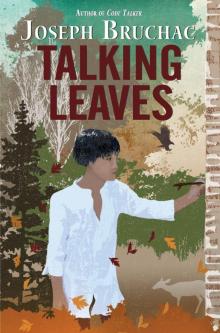 Talking Leaves
Talking Leaves Found
Found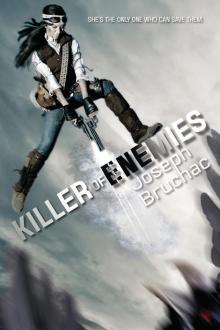 Killer of Enemies
Killer of Enemies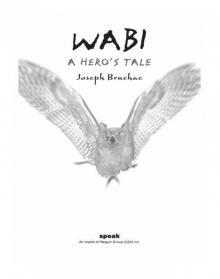 Wabi
Wabi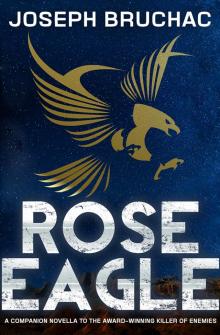 Rose Eagle
Rose Eagle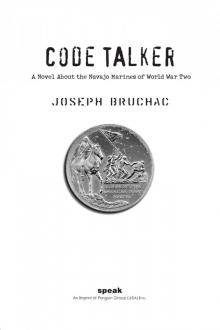 Code Talker
Code Talker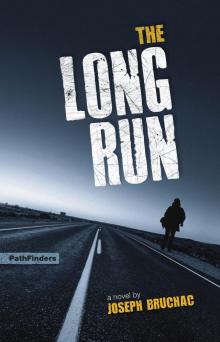 The Long Run
The Long Run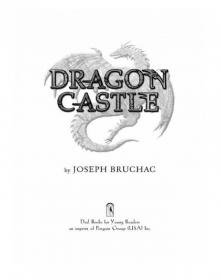 Dragon Castle
Dragon Castle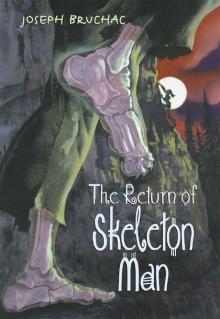 The Return of Skeleton Man
The Return of Skeleton Man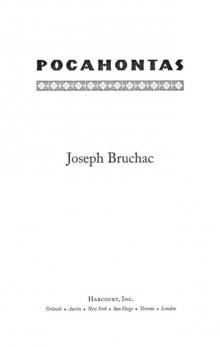 Pocahontas
Pocahontas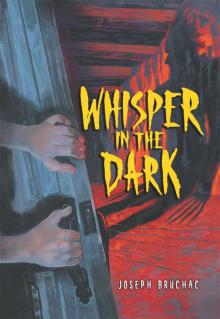 Whisper in the Dark
Whisper in the Dark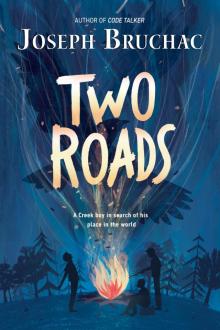 Two Roads
Two Roads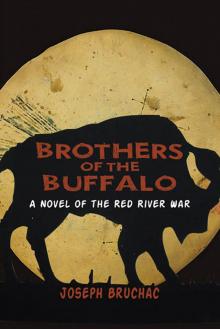 Brothers of the Buffalo
Brothers of the Buffalo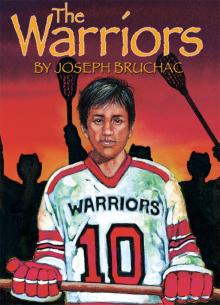 The Warriors
The Warriors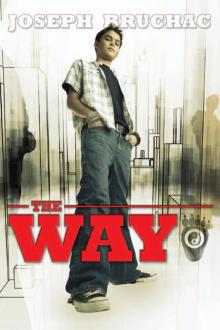 The Way
The Way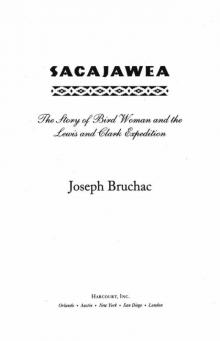 Sacajawea
Sacajawea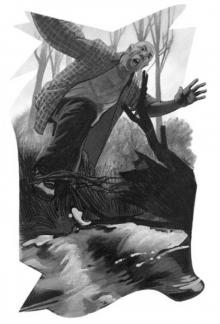 Night Wings
Night Wings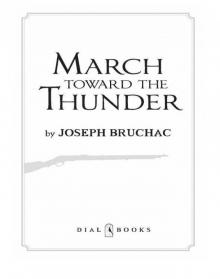 March Toward the Thunder
March Toward the Thunder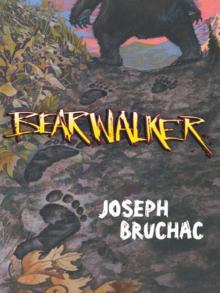 Bearwalker
Bearwalker Skeleton Man
Skeleton Man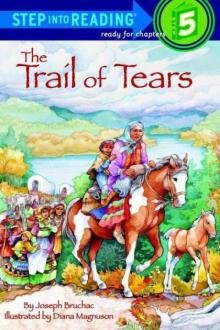 The Trail of Tears
The Trail of Tears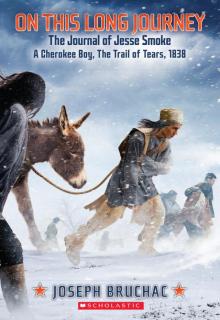 On This Long Journey
On This Long Journey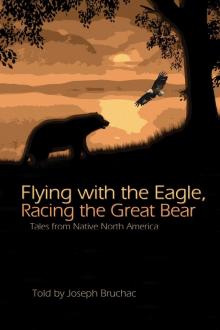 Flying with the Eagle, Racing the Great Bear
Flying with the Eagle, Racing the Great Bear